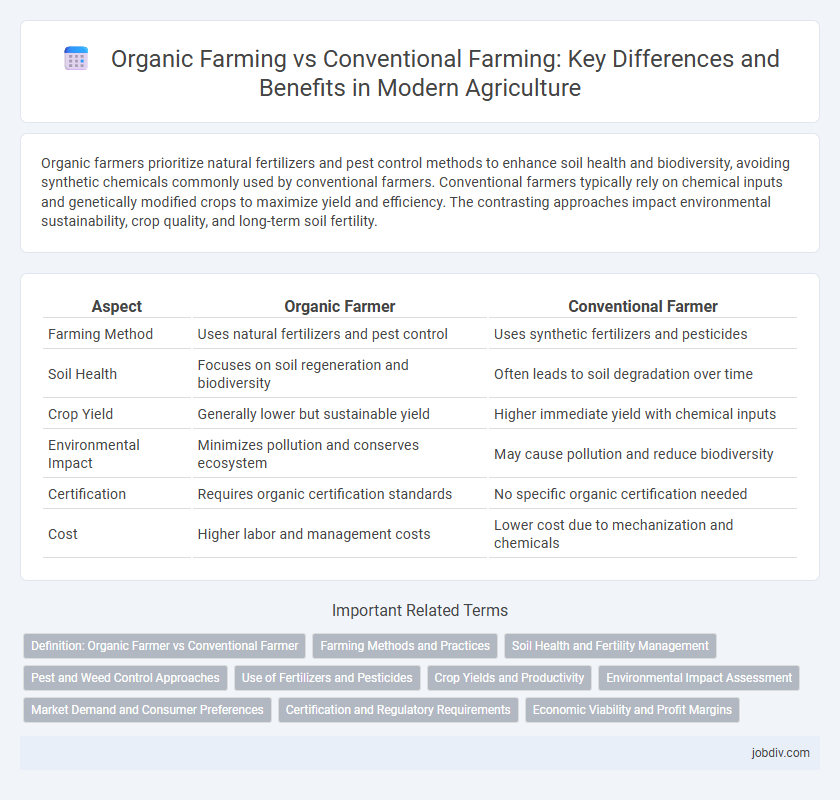Organic farmers prioritize natural fertilizers and pest control methods to enhance soil health and biodiversity, avoiding synthetic chemicals commonly used by conventional farmers. Conventional farmers typically rely on chemical inputs and genetically modified crops to maximize yield and efficiency. The contrasting approaches impact environmental sustainability, crop quality, and long-term soil fertility.
Table of Comparison
| Aspect | Organic Farmer | Conventional Farmer |
|---|---|---|
| Farming Method | Uses natural fertilizers and pest control | Uses synthetic fertilizers and pesticides |
| Soil Health | Focuses on soil regeneration and biodiversity | Often leads to soil degradation over time |
| Crop Yield | Generally lower but sustainable yield | Higher immediate yield with chemical inputs |
| Environmental Impact | Minimizes pollution and conserves ecosystem | May cause pollution and reduce biodiversity |
| Certification | Requires organic certification standards | No specific organic certification needed |
| Cost | Higher labor and management costs | Lower cost due to mechanization and chemicals |
Definition: Organic Farmer vs Conventional Farmer
Organic farmers cultivate crops and raise animals without synthetic pesticides, fertilizers, or genetically modified organisms, emphasizing natural processes and soil health. Conventional farmers utilize synthetic chemicals, mechanization, and genetically modified seeds to maximize crop yields and control pests. The primary distinction lies in the farming practices, environmental impact, and certification standards governing organic versus conventional methods.
Farming Methods and Practices
Organic farmers rely on natural fertilizers such as compost and green manure to enhance soil fertility, avoiding synthetic chemicals and pesticides to maintain ecological balance. Conventional farmers typically use chemical fertilizers and pesticides to maximize crop yields and control pests efficiently. Both methods impact soil health differently, with organic practices promoting biodiversity and soil structure, while conventional techniques often prioritize immediate productivity and pest management.
Soil Health and Fertility Management
Organic farmers prioritize soil health by using natural compost, crop rotation, and cover crops to enhance microbial activity and maintain nutrient balance. Conventional farmers often rely on synthetic fertilizers and chemical pesticides, which can lead to soil degradation and reduced long-term fertility. Sustainable soil fertility management in organic systems supports biodiversity and improves soil structure, promoting resilience against erosion and nutrient depletion.
Pest and Weed Control Approaches
Organic farmers rely on natural pest control methods such as crop rotation, biological pest control, and the use of organic pesticides derived from natural sources to manage pests and weeds, avoiding synthetic chemicals. Conventional farmers typically utilize synthetic herbicides and pesticides for more immediate and broad-spectrum pest and weed control, often resulting in higher chemical residues in the soil and water. Integrated pest management (IPM) is increasingly adopted by both to optimize effectiveness while minimizing environmental impact.
Use of Fertilizers and Pesticides
Organic farmers rely on natural fertilizers such as compost, manure, and cover crops to enhance soil fertility, avoiding synthetic chemicals to maintain environmental sustainability. Conventional farmers typically use chemical fertilizers like urea and ammonium nitrate alongside synthetic pesticides to promote rapid crop growth and control pests effectively. The contrasting approaches significantly impact soil health, biodiversity, and long-term ecosystem balance in agricultural practices.
Crop Yields and Productivity
Organic farmers often experience lower crop yields compared to conventional farmers due to restrictions on synthetic fertilizers and pesticides, impacting overall productivity. Conventional farming methods utilize chemical inputs and genetically modified seeds, resulting in higher and more consistent crop yields per hectare. Despite this, organic farming enhances soil health and biodiversity, which can improve long-term sustainability and crop resilience.
Environmental Impact Assessment
Organic farmers reduce environmental impact by avoiding synthetic pesticides and fertilizers, promoting biodiversity and improving soil health through natural practices. Conventional farmers often rely on chemical inputs that can lead to soil degradation, water pollution, and reduced biodiversity. Environmental Impact Assessments highlight organic farming's benefits in lowering greenhouse gas emissions and preserving ecosystem services compared to conventional methods.
Market Demand and Consumer Preferences
Organic farmers respond to growing market demand driven by health-conscious consumers seeking pesticide-free and sustainably produced food. Conventional farmers typically produce higher yields at lower costs, appealing to price-sensitive buyers and large-scale retailers. Consumer preferences increasingly favor organic products for perceived environmental and health benefits, fueling premium market segments despite higher prices.
Certification and Regulatory Requirements
Organic farmers must adhere to stringent certification processes governed by organizations such as the USDA National Organic Program, which mandates no synthetic pesticides, fertilizers, or GMOs for at least three years prior to certification. Conventional farmers, while subject to general agricultural regulations, face fewer restrictions on chemical usage and are not required to obtain specific organic certifications. Compliance with these certification and regulatory standards directly impacts market access, pricing strategies, and consumer trust between organic and conventional farming operations.
Economic Viability and Profit Margins
Organic farmers often face higher initial costs due to certification, organic seeds, and labor-intensive practices, but they can achieve premium market prices that improve overall profit margins. Conventional farmers benefit from lower input costs through synthetic fertilizers and pesticides, leading to higher yields and economies of scale, which can enhance short-term economic viability. Market demand trends and crop selection significantly influence the profitability of both farming methods in diverse agricultural economies.
Organic Farmer vs Conventional Farmer Infographic

 jobdiv.com
jobdiv.com